"No More Coal by Road at
Page 85

If you've noticed an error in this article please click here to report it so we can fix it.
Railways' Expense ,9 POINTING out that there had been a considerable fall in the railways' coal and coke traffic. Mr. S. W. Nelson, Western Licensing Authority, said last week that he would not be prepared to grant any additional road facilities unless there were some special reason.
Mr. Nelson agreed, however, to allow two hauliers to carry coal and coke to destinations not connected to rail sidings.
F. Whittock, Ltd., Pultency Garage, Bath, asked for "coke within 150 miles" to be added to the conditions of 15 B-licence vehicles. Mr. A. Barwell, managing director of the British Mineral Corporation, said the War Office and the R.A.F. had decided to switch from gas coke to furnace coke. and they wanted Whittock*s to haul 8,000 tons of it from London to Salisbury Plain.
They had quoted a lower rate than the. railways, who could deliver only to a station and could not undertake stacking and trimming. After being handed the rates on a piece of paper, Mr. Nelson was told by a railway transit clerk that plenty of trucks were available and the rail rate could have been cut.
Making the grant, Mr. Nelson commented: "I have to look very carefully into the question of carriage of coke and coal by road owing to the reduction in railway carryings. It has not been said that I must refuse every application, but I have to examine each case carefully.
'In this case, I am told that this customer and their associated companies pay the railways millions of pounds. It therefore seems to me that they use road when it is most suitable."
The railways could do a wonderful job, which had been illustrated by the way they won back grain traffic from Avonmouth to the West Country. However, the coke tender was accepted on the basis of road haulage, and there was no evidence that other operators would be affected, In the second case, Mr. E. W. Hatton. Drybrook, Glos., had his B-licence conditions varied to include: "Goods for Drybrook Quarries from 75 to 150 miles, and solid fuel for W. Cory and Son, Ltd., 120 miles." This was also opposed by the railways.
A witness from Cory's said the Clean Air Act had made it necessary for them to have coal carried from Neath and Mansfield without any increase in delivery costs. The company were "railway minded," but deliveries would have to be made to a point which was not connected to a siding. It did not mean a switch was to be made from rail to road.
Mr. Nelson stated: "I must not grant additional facilities to road if it means taking traffic direct from the railways without some special reason." He thought there was a special reason in this case.












































































































































